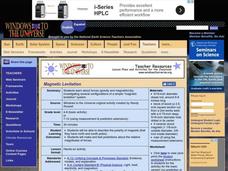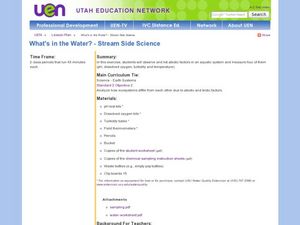Curated OER
Bearly There
First graders read "How Long Is A Foot?" together and use paper clips, teddy bears, crayons and other non-standard units to measure items. They compare the items measured and order them from longest to shortest.
Curated OER
Va Va Va Zoooommm
Young scholars, in groups, measure a variety of physical components to several activities. They use both standard and non-standard forms of measurement and then develop conclusions about the use of units in measurement.
EngageNY
Sequencing Rotations
Discover the result of a sequence of rotations about different centers. Pupils perform rotations to examine the patterns. They also describe the sequence of rotations that performed to reach a desired result in the ninth installment in a...
EngageNY
Rotations
Searching for a detailed lesson to assist in describing rotations while keeping the class attentive? Individuals manipulate rotations in this application-based lesson depending on each parameter. They construct models depending on the...
Curated OER
SIZING UP SOL
Ninth graders produce a projected, pinhole image of the sun and from measurement of the image and projection distance, calculate the actual size of the sun. They estimate the sun's apparent brightness from different planet.
Curated OER
Marshmallow Fun Day - math
Early learners rotate to different classroom centers and participate in six activities based on using marshmallows to review concepts learned. They make: marshmallow sculptures (geometric shapes), the shape of mittens using colored...
Teach Engineering
Mechanics of Elastic Solids
Make the connection between Hooke's law and elasticity with an activity that introduces the class to the behavior of elastic materials. The resource defines stress and strain to calculate the modules of elasticity of materials and also...
Curated OER
How Toxic Is It?
Students participate in an activity in which they investigate the scientific method and seed germination as well as practice graphing and metric measuring skills. Students examine toxicity by exposing Wisconsin Fast Plants seeds to toxic...
Baylor College
Body Mass Index (BMI)
How do you calculate your Body Mass Index, and why is this information a valuable indicator of health? Class members discover not only what BMI is and practice calculating it using the height and weight of six fictitious individuals, but...
EngageNY
Arc Length and Areas of Sectors
How do you find arc lengths and areas of sectors of circles? Young mathematicians investigate the relationship between the radius, central angle, and length of intercepted arc. They then learn how to determine the area of sectors of...
Curated OER
Earth Science Regents: The Ellipse
Starting with the instructions to draw an ellipse, and with great pictures, this sheet should help your pupils learn the shapes and measurements involved. Using push pins and string, your class can discover the axis and focus points...
Curated OER
Can Young Children Distinguish Between Living and Non-living Things?
What does it mean to be living? Help your young scientists identify living and non-living things as a result of their learning through discovery. Observation of and interaction with a set of natural phenomena in their community will make...
Curated OER
Bloodstain Pattern Simulations: A Physical Analysis
Students receive bloodstain pattern evidence from a crime scene. They answer a series of questions through inquiry, observation, measurement, and analysis. Pupils complete this challenge, by reconstructing the evidence through four...
Curated OER
Sunrise/Sunset
Third graders discovver what causes the dramatic colors of a sunset by seeing the changing color of light as it passes through a clear container of water to which milk is gradually added. They measure the liquids and observe what happens...
Curated OER
Magnetic Levitation
A thorough investigation of magnetic levitation; this activity has four parts. First, physical scientists play with a wooden dowel and three disc magnets to review polarity and repelling action. Then they experiment with the strength of...
US Environmental Protection Agency
Weather and Climate: What's the Difference?
Future weather forecasters collect daily temperatures over a period of time. Afterward, they compare their data with monthly averages, as researched on national weather websites, in order to grasp the difference between weather and...
EngageNY
Complex Numbers and Transformations
Your learners combine their knowledge of real and imaginary numbers and matrices in an activity containing thirty lessons, two assessments (mid-module and end module), and their corresponding rubrics. Centered on complex numbers and...
It's About Time
A Running Start and Frames of Reference
Ttake learning to the next level! Individuals research inertial mass, a physical property of matter, and apply what they learn through a series of activities designed to stimulate the senses. They demonstrate Galileo's Principle of...
Mathematics Vision Project
Module 5: Circles A Geometric Perspective
Circles, circles, everywhere! Pupils learn all about circles, central angles, inscribed angles, circle theorems, arc length, area of sectors, and radian measure using a set of 12 lessons. They then discover volume formulas through...
Curated OER
Trekking to Timbuktu: Restoring the Past
Students investigate the environmental factors that threaten Timbuktu. Students investigate what measures are being taken to restore their mosques, and the condition of their ancient manuscripts. Students discover information about the...
Curated OER
What's in the Water? - Stream Side Science
Here is a complete activity in which young biologists or ecologists test the pH, dissolved oxygen, turbidity and temperature of stream water. The class visits an actual stream and makes observations of the site. They use scientific...
Baylor College
Comparing Sizes of Microorganisms
Kids compare what printed text looks like with the naked eye and under magnification. They discuss the extremely small scale that must be used to measure the size. They learn about the micrometer unit, then draw scale models of a variety...
Howard Hughes Medical Institute
Ocean Acidification
Human impacts on the environment can sometimes be difficult to measure, especially under water! An activity centered on ocean acidification gives science scholars the opportunity to examine the effects of carbon dioxide on marine life....
Curated OER
Investigating The Mysteries Of Third Grade
Third graders use logic and knowledge of mathematics facts to solve problems. They see that pigments can be broken down into separate colors. Pupils recognize the capacity of water to move upward and measure the height water travels up...

























